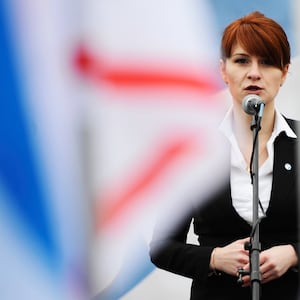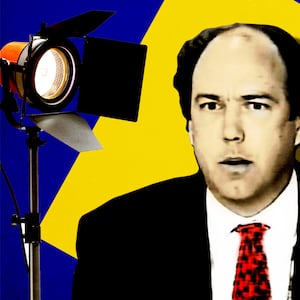Maria Butina, the gun-slinging Russian accused of being a foreign agent, pleaded guilty Thursday to a conspiracy charge as part of a cooperation agreement she inked with federal prosecutors.
Prosecutors will ask for a lighter sentence for Butina, who has been jailed since July, but said she is “very likely” to be deported once she is released.
The plea by the 30-year-old, who cozied up to powerful U.S. conservatives and the National Rifle Association, was expected because details of her plea agreement were revealed earlier in the week.
ADVERTISEMENT
Under the deal, the feds dropped a count of acting as a covert foreign agent—a charge legal experts refer to as “espionage-lite”—and she agreed to plead to conspiracy to act as one.
Butina, who started a gun-rights organization in Russia before she came to the U.S. and enrolled in grad school, tried to leverage her D.C. connections to establish a secret backchannel between the Kremlin and the Trump administration, prosecutors say.
She was in constant contact with Alexander Torshin, a former Russian central bank official, about her plans and sought financial support from an unnamed Russian billionaire.
Her boyfriend is conservative activist Paul Erickson, who has received a target letter from prosecutors notifying him that they are considering charging him with acting as a foreign agent. In a statement Tuesday, Erickson’s attorney said he is “a good American” who “has never done anything to hurt our country and never would.”
Although the plea deal calls for Butina to cooperate, her father Valery said his daughter has no intention of implicating anyone else. He also claimed that she had neither sought nor been offered U.S. citizenship as part of any deal.
Butina’s case has attracted high-level attention in Russia. On Tuesday, Russian President Vladimir Putin denied that his intelligence services had anything to do with Butina. Putin told reporters that he only learned about the existence of the “poor girl” after her arrest and that his spy agencies reported that no one “knows anything about her.”
American law enforcement disagrees.
Photographs taken by FBI agents showed Butina meeting with an officer from Russia’s Federal Security Service (FSB) at a Washington restaurant, and a note agents found at her apartment shows her mulling “How to respond to FSB offer of employment?” Putin’s spokesman Dmitry Peskov declined to comment on the plea deal.
Russian diplomats visited her in prison half a dozen times and fired off at least four diplomatic notes to the State Department to protest the conditions of her detention. Prosecutors argued that Moscow’s intense interest in the Butina case was proof of “her relationship with, and value to” the Russian government.







